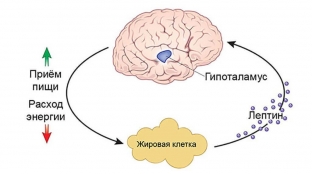"No – food, yes – movement! - with such a slogan, many obese people begin to fight overweight, turning restrictions on the menu into their religion. Why is this "opium for the people" does not work? Why can't even those who are on the strictest diet lose weight? The answer is insultingly simple: because they do not know how to control the level of leptin – a hormone that is responsible for the troubles of overweight people. The secret of how to make friends with this intractable enemy of harmony, which received the original name of the satiety hormone, will be shared by estet-portal.com.
Hormone versus diet?
One and a half billion people – this is a frightening figure according to the WHO of obese people all over the world. In America full of people – 35%, in England – 25%, in Ukraine – 26% women and 16% men. Who or what is to blame for the extra pounds? Scientists all over the world are concerned about this problem. Not so long ago, their efforts to find the "guilty" were successful.
A breakthrough was outlined at the end of the last century, when Spanish doctors conducted an experiment by putting a hundred overweight people on a weekly low-calorie diet. At first, it looked like the experiment was a success, with participants losing up to 5% of their body weight. When, after 4 months, all members of the group were re-assembled in order to find out if they managed to maintain the result, pundits were shocked: most of the participants returned to their "pre-experimental" weight. And this despite the fact that they continued to diet!!!
It seems that how much they eat was no longer important, because the bodies of the subjects did not recognize the quality, properties and quantity of food. Their "hormonal thermostats" worked at full speed, but did not function properly because they did not send objective information about nutrition to the brain.
Spanish scientists found high levels of a hormone called leptin in those participants in the experiment who could not lose weight.
What is leptin and how is it eaten?
Discovered in the 90s of the last century, the hormone "manages" appetite, fat levels, and also regulates energy metabolism. Leptin – a protein hormone produced in adipose tissue. The level of leptin is proportional to the mass of adipose tissue. This hormone informs the brain whether we are full and whether the body has enough energy. A high level of leptin should signal that we no longer need food, which means that the feeling of hunger should leave us. When the brain concludes that the body no longer needs to be satiated, leptin levels return to normal. We no longer feel like eating, and the body begins to burn fat reserves, the metabolism accelerates. I foresee the bewilderment of all who read these lines. After all, it turns out like this: the more fat (that is, the more excess weight), the higher the level of leptin, so, the less appetite and the faster the body burns fat! Then where do fat people come from and why does fat not disappear?! Alas, there is one caveat: leptin really signals the brain about the intake of fat into the body, BUT! But only about SUFFICIENT quantity of it! If there is an excess of fat, then problems begin. The legs of these problems grow from a phenomenon called leptin resistance, that is, a decrease in sensitivity to leptin.
Insomnia, high blood pressure, need for snacks, unbridled craving for sweets, angry outbursts, nausea after eating – these are all symptoms of leptin resistance.
The reasons for this phenomenon may be:
- insulin resistance, indicating pre-diabetes (determined by blood sugar levels);
- increased blood triglyceride levels (may be due to overindulgence in sweets, refined foods).
Signs of leptin resistance:
- weight gain;
- uncontrolled consumption of sweets and salty foods;
- "jamming" stress;
- desire «what – then chew before bed;
- the need to snack after the main meal;
- high blood pressure;
- insomnia;
- unsuccessful attempts to lose at least a couple of kilograms;
- concentration problems;
- uncontrollable fits of anger;
- not feeling well;
- nausea after eating.

Why is leptin control important?
So, we have decided that two aspects are important for successful fat burning in the body: a sufficient level of leptin and the correct functioning of receptors that transmit satiety signals to the brain. But if you tighten the diet all the time, reducing calories, then the level of leptin will drop catastrophically, thus slowing down the burning of fat and, accordingly, the process of losing weight. After all, the body reads a decrease in the level of leptin as a threat of hunger and launches a “savings mode”; - that is, it slows down the metabolism.
As far as satiety signals are concerned, the brain usually receives them about 20 minutes after the start of the meal. In obese people, this process often takes longer, and leptin resistance does its bit: the brain simply does not hear signals that the "fuel" enough and it would be time to close the "furnace". Hence the overeating, and the constant feeling of hunger.
How to control leptin levels?
Susceptibility to a certain concentration of leptin in the blood is mainly due to genetics, but diet and lifestyle have a huge impact on the functioning of fat regulators. What to do and how to eat to get rid of the curse of leptin resistance, so that the level of leptin is normal and in communication "leptin-brain" no crashes? 3 aspects are important for controlling leptin levels:
- Sleep: full 7-8 hours (no less and no more). Those who sleep the required number of hours have higher levels of leptin with a lower body fat ratio.
- Physical activity. Regular, vigorous exercise helps control leptin levels.
- Proper nutrition, healthy products.
Let's dwell on the last aspect in more detail. Although the level of leptin does not really depend on the number of calories, it is still not worth absorbing everything in a row and without measure. First of all, you need to decide on the "correct" products. So healthy food is:
- vegetables: broccoli, cabbage, carrots, asparagus, garlic, leeks, bell peppers, arugula, romaine lettuce, spinach, tomatoes;
- herbs and seasonings: ginger, ginseng, cinnamon, chamomile, blueberry, mint, turmeric, green tea, echinacea, aloe vera, dandelion leaves;
- fruits: grapefruit, cherries, blueberries, bananas, apples, oranges;
- white meat, fish.

But that's not all. "The Right Foods" you need to eat right, that is, adhere to certain dietary principles.
To get rid of the yo-yo effect – the return of lost kilograms, it is important to control the level of leptin by eating the "right" foods. products and adhering to certain dietary principles.
Leptin Control Diet
Basic dietary rules to control leptin levels are as follows:
- Do not go on strict diets abruptly, otherwise the body will turn on the “alarm”; and will become fiercely protective of fat.
- Food should be varied, consisting mainly of vegetables and fruits (it is important that they are of different colors), as well as good quality fish and white meat.
- Meals should be seasoned with plenty of spices and herbs (avoiding chili and other hot spices).
- Nuts and seeds (walnuts, almonds, sesame seeds, flaxseeds) must be fresh and never roasted.
- Supplement your diet with foods containing omega-3 polyunsaturated fatty acids: salmon, tuna, legumes (soybeans, red and white beans), and the nuts and seeds already mentioned.
- Eat low glycemic cereals: durum wheat pasta, brown rice, millet cereal, barley.
- Introduce organic protein-rich foods into the menu: fatty white fish (e.g. flounder, cod), chicken and turkey meat, tofu, natural unsweetened yogurt.
- Eggs should be eaten properly, leaving the yolk intact, as broken eggs (e.g. in scrambled eggs, scrambled eggs) release toxic products. Thus, boiled eggs should be eaten whole, but scrambled eggs or scrambled eggs should be made only from proteins.
- Remove refined sugar and all products containing it from the diet.
- Be careful with carbs (potatoes, white rice, white bread), avoid foods with white sugar (pastries, confectionery) and high glycemic index (e.g. beer).
- Introduce high-quality nutritional supplements rich in B vitamins, omega 3 polyunsaturated fatty acids, magnesium, zinc into the diet.
- Avoid pseudo-low-calorie foods such as artificial sweeteners and non-alcoholic diet drinks that have been found to inhibit weight loss.
- Eat no more than 3 times a day, no snacks. Interval between meals – 5 o'clock. With this mode, the body will have nothing left but to "snack"; with its energy reserves, that is, fat.
- Breakfast should be high in protein. This will contribute to the rapid burning of fat.
- Do small portions. Overeating contributes to the development of leptin resistance.
- Last meal of the day – dinner. The ban on any food after dinner and on sleeping with a full stomach. The time between dinner and breakfast should be 11-12 hours.
- Drink plenty of water, green and black tea, juices (vegetable berry, cherry, pomegranate).
Only by taking control of your leptin levels, adhering to the principles of proper nutrition and leading a healthy lifestyle, you can avoid the yo-yo effect and get rid of extra pounds forever.






Add a comment